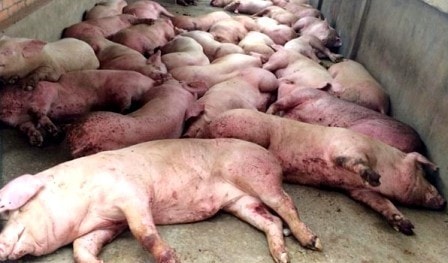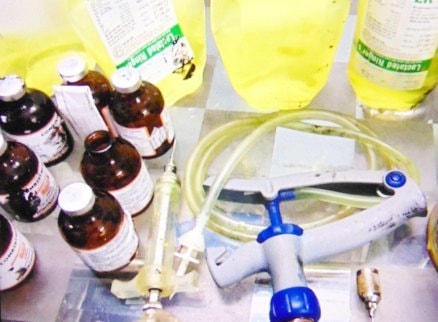More than 5,000 sedated pigs will continue to be served on the dinner table?
Not only have they not been able to find a way to completely deal with the pigs injected with tranquilizers, the authorities have also "left open" the possibility of continuing to license the pigs to be put on people's tables. While the responsibility of those involved remains unclear, the violators are only subject to administrative fines.
The incident of more than 5,000 pigs being injected with tranquilizers at the Xuyen A slaughterhouse in Cu Chi district is not only causing confusion but also generating public outrage. Consumers believe that they have not only been poisoned by dishonest traders but also by the authorities - specifically those who are paid by the people's taxes - who are "betrayed" or "indifferent and irresponsible".
After the "earth-shattering" incident was jointly investigated and exposed by the Police and Agriculture sectors, on September 30, the Ministry of Agriculture and Rural Development held a press conference at the Veterinary Department, Ho Chi Minh City to provide preliminary information about the scandal in the livestock industry and pork trade.
 |
| Pigs injected with tranquilizers will fall into a deep sleep without losing weight, but users will suffer the effects. |
Mr. Pham Tien Dung, Head of the Inspectorate of the Ministry of Agriculture and Rural Development, said that the incident originated from the people's complaints about the Xuyen A slaughterhouse (Tan Phu Trung commune, Cu Chi district, Ho Chi Minh City) injecting sedatives into pigs before slaughter. After initially verifying the information from the people, the Ministry of Agriculture coordinated with the police to conduct steps to penetrate the field and investigate.
After more than a month of sending elite reconnaissance forces to the area, approaching and grasping in detail the activities at the Xuyen A slaughterhouse, on the evening of September 28 and early morning of September 29, the interdisciplinary inspection force raided and suddenly inspected the above facility. At the scene, many medicine boxes containing yellow solution (initially suspected to be sedatives) and IV bottles used for syringes capable of injecting many pigs in a short time...
Mr. Tien Dung said that at the time of inspection, many slaughterhouses did not admit to injecting drugs into pigs with acts of "denying the crime". Immediately, the inspection force proceeded to draw up a record to take samples for testing, at this point most of the slaughterhouses admitted to injecting sedatives into pigs outside the veterinary industry's instructions.
 |
| Evidence seized by authorities at the scene of the incident |
On September 30, the investigation agency's test results determined that the urine, blood and meat samples of the pigs tested positive for Acepromazine. This is a drug that has anticonvulsant, sedative, analgesic, anti-stress, and anti-allergic effects in animals. These drugs are registered for veterinary use to treat animals according to the manufacturer's instructions but are not allowed to be used for other purposes. The active ingredient of Acepromazine has a central nervous system inhibitory effect and is often used as a pre-anesthetic in surgery.
Mr. Tien Dung affirmed that Acepromazine is not on the list of drugs banned for veterinary use. However, the act of injecting sedatives into pigs before slaughter is contrary to the drug manufacturer's instructions, this is a condemnable act. The injection of sedatives before slaughter was initially determined not to increase weight or commit commercial fraud, but to make the animal sleepy, not urinate to limit weight loss, to make the meat color more beautiful to deceive consumers or to make the animals not cry or bite each other...
If people regularly consume animal meat containing Acepromazine, it will increase the risk of digestive diseases, nephrotic syndrome, neurological diseases, dementia, depression, tremors... The above consequences will cause a burden on medical costs, degrade the quality of the breed, and hinder socio-economic development.
Statistics from the investigation agency show that at the time of the surprise inspection, 3,750 out of 5,231 pigs at the Xuyen A slaughterhouse were injected with tranquilizers. This is the largest slaughterhouse in the city, the number of pigs at the time of inspection accounted for more than 50% of the total number of pigs that will be supplied to the market every day.
The violation is clear, but the direct management agency, the Veterinary Department, Ho Chi Minh City, is responsible for the incident. However, up to now, the responsibility and form of handling for those involved have not been mentioned. Whether or not there is collusion to protect the above violation by the state management agency is still an open question.
Responding to a question from Dan Tri reporter about how to handle violators and the above-mentioned batch of pigs injected with tranquilizers, Mr. Tien Dung said that violators will be administratively fined from 30 to 35 million VND. Currently, there are no regulations on banning the circulation or destroying pigs containing Acepromazine.
The entire number of pigs in violation is being strictly managed, the authorities will take samples for re-testing. If the results are negative for the above substance, the pigs that are temporarily suspended from circulation will be granted a license to slaughter for supply to the market. However, the representative of the Ministry of Agriculture and Rural Development could not answer the question of whether pigs that have been injected with tranquilizers, even if the results are negative for Acepromazine, can ensure the health of consumers.
According to Dan Tri Newspaper
| RELATED NEWS |
|---|
